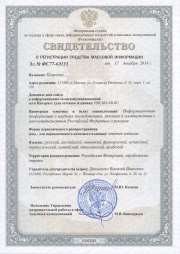|
MAIN PAGE
> Back to contents
Psychologist
Reference:
Suvorova N.V., Nakonechnaya E.V., Smirnaya A.A., Smirnova A.V., Shepeleva Y.S.
The level of adaptation to learning among first-graders brought up in families with different types of child-parent relationships
// Psychologist.
2023. ¹ 5.
P. 159-182.
DOI: 10.25136/2409-8701.2023.5.43957 EDN: DSQMOM URL: https://en.nbpublish.com/library_read_article.php?id=43957
The level of adaptation to learning among first-graders brought up in families with different types of child-parent relationships
Suvorova Nataliya Vladimirovna
PhD in Pedagogy
Associate Professor, Department of Psychology, Siberian Institute of Business, Management and Psychology
660037, Russia, Krasnoyarsk, Moskovskaya str., 7a

|
nata.suvorova.7474@inbox.ru
|
|
 |
Other publications by this author
|
|
Nakonechnaya Ekaterina Vladimirovna
PhD in Psychology
Associate Professor, Department of Psychology, Siberian Institute of Business, Management and Psychology
7a Moskovskaya str., Krasnoyarsk, 660037, Russia

|
jurcity@yandex.ru
|
|
 |
Other publications by this author
|
|
Smirnaya Anastasiya Andreevna
PhD in Pedagogy
Associate Professor, Department of Psychology and Pedagogy, Siberian State University of Science and Technology named after M.F. Reshetnev
82 Mira str., Krasnoyarsk, 660049, Russia

|
nastenasm@yandex.ru
|
|
 |
Smirnova Anastasiya Viktorovna
PhD in Pedagogy
Associate Professor, Department of English Philology, Krasnoyarsk State Pedagogical University named after V.P. Astafieva
89 A. Lebedeva str., Krasnoyarsk, 660060, Russia

|
anastasyavic@mail.ru
|
|
 |
|
Shepeleva Yuliya Sergeevna
Senior Lecturer, Department of Philosophy and Social Sciences and Humanities, Krasnoyarsk State Medical University named after prof. V.F. Voyno-Yasenetsky
660022, Russia, Krasnoyarsk, Partizan Zheleznyak str., 1

|
lady@mail.ru
|
|
 |
|
DOI: 10.25136/2409-8701.2023.5.43957
EDN: DSQMOM
Received:
04-09-2023
Published:
06-11-2023
Abstract:
The subject of the study is the relationship between child–parent relations and the effectiveness of adaptation of first-graders.The purpose of the study is to determine the level of adaptation to learning among first-graders brought up in families with different types of child-parent relationships. The importance for a child of child-parent relations in a difficult period for him at the beginning of school education is emphasized by many authors. Often, the reason for difficulties in adapting to school lies in the lack of formation of personal forms of communication between a younger student and his parents, in the inability of parents to build communication with a child according to the type of "child – adult as equal", in the habit of a parent to communicate with an already grown-up child according to the stereotype formed in preschool childhood. The study was conducted on the basis of the municipal autonomous educational institution "Secondary School No. 19 named after A.V. Sedelnikov" of the city of Krasnoyarsk. 30 parents (mothers of first-graders) and 30 children aged 7 years were diagnosed. There is a direct relationship between child-parent relations and the adaptation of first-graders to school. Students who are brought up in families with a democratic type of upbringing are characterized by successful, full adaptation. Schoolchildren from families in which permissive and authoritarian parenting styles are the predominant types of child-parent relationships, incomplete adaptation and maladaptation prevail. The conducted research makes it possible to develop psychological programs to increase the level of adaptation of first-graders to education for parents with an authoritarian parenting style and for parents with a permissive parenting style.
Keywords:
adaptation, first graders, family, parent-child relationship, upbringing, education, motivation, parents, adaptation level, success
This article is automatically translated.
You can find original text of the article here.
Relevance of the research topic. In the modern world, the understanding of the family as determining not only the development of the child, but also the development of society as a whole is increasing more and more. It is the family that ensures the socialization of the child, opens and structures the world for him, highlighting significant criteria for orientation in it. The transition of a child to systematic schooling is considered one of the most difficult stages of his life. The beginning of school education is associated with radical changes in the child's lifestyle, including a new attitude on the part of parents in the family. Attention to the problem of school adaptation of first-graders in modern psychological and pedagogical theory and practice is increasing due to the fact that the number of children with difficulties in learning activities, experiencing increased anxiety, problems in establishing relationships with classmates and teachers is growing. Unsatisfactory child?parent relations at the stage of primary school education provoke the emergence of more complex disorders at an older age, contribute to the formation of various character accentuations during adulthood. The Federal state educational standard of preschool education is aimed at solving the following tasks: the formation of a general culture of children's personality, the development of their social, moral, aesthetic, intellectual, physical qualities, initiative, independence and responsibility of the child, the formation of prerequisites for educational activity. The argument in favor of the need to prepare children for school is the increasing number of first-graders who are unable to cope with the academic load and adapt to school life. Teachers and psychologists note that the beginning of school education radically changes the way of life of a child. In connection with the acquisition of a new social role – the role of a schoolboy, the position of the child in the family changes: with some privileges, new requirements are also imposed, related, for example, to the need to fulfill the daily routine corresponding to the school schedule [19, 20] At this time, the requirements for the child's skills and development increase significantly, formal assessments of his achievements and failures, and informal reactions of parents to these assessments also appear. In this regard, the child enters into a complex relationship of mediation between two institutions of socialization – family and school. Often, the reason for difficulties in adapting to school lies in the lack of formation of personal forms of communication between a younger student and his parents, in the inability of parents to build communication with a child according to the type of "child – adult as equal", in the habit of a parent to communicate with an already grown-up child according to the stereotype formed in preschool childhood [21, 22]. Theoretical formulation of the problem. The importance of the relationship between parents and children attracts the attention of many psychologists of various schools and directions. Vast experience has been accumulated in the field of child-parent relations (A.Ya. Varga, N.B. Zhuraeva, L.V. Zelenaya [5, 10, 11]). It is proved that the role and importance of family in a person's life cannot be overestimated. It is the family that is the basis for the formation of the most significant social functions. The family is a unique social institution, an intermediary between the individual and society, a translator of fundamental values from generation to generation [1, 8]. It is well known that the role of the family is very great in the formation of the child's worldview, his worldview and idea of the social structure of the world [2, 3? 18]. The child-parent relationship is the component that determines the development of the mental component of the child, as well as determines the formation of his personality. Varavina E.A. [4], Vasyuk S.N. [6], Gaidukova D.V. write about this [7] The influence that parents have on a child is inextricably linked with educational influences on him. Parents have certain ideas about the child – and this is the internal or indicative basis of education . The importance of child-parent relations for a child in a difficult period of the beginning of school education is emphasized by many authors (Grigorieva E.L. [9], Matyushkina E.G. [13]). Studies of the mechanisms of influence of parents on the effectiveness of the child's adaptation to the situation of school education have been conducted (Kalashnikova S.V. [11], Movsisyan K.A. [14]). It is proved that parents' value orientations, emotional attitude to the child, the way parents perceive the child, the style of family upbringing – all this is a significant factor in the child's adaptation to school [15, 16, 17]. Abroad, the problem of adaptation of first-year students to school in connection with the nature of child-parent relations is studied by Hoste G., Ken M., Lollge H. Masironi R. Denolin H. [23, 24, 25, 26] Research. The aim of the study was to determine the level of adaptation to learning among first-graders raised in families with different types of child-parent relationships The subject of the study is the relationship between child–parent relations and the effectiveness of adaptation of first-graders. Methods were used to study the type of child-parent relationship: - questionnaire "Parent-child interaction" by I.M. Markovskaya (for parents of preschoolers and younger schoolchildren); - questionnaire of the style of parental education (DIA) by E.G. Eidemiller, V.K. Justitskis (for younger schoolchildren). To study the level of adaptability of first graders, methods were applied: - questionnaire "The level of school motivation" (N.G. Luskanova); - methodology for determining the personal adaptability of schoolchildren (A.V. Furman); - methodology "Expert assessment of a child's adaptability to school" (Chirkov V.I., Sokolova O.L., Sorokina O.V.). The empirical base of the study. Municipal Autonomous educational institution "Secondary School No. 19 named after A.V. Sedelnikov" of the city of Krasnoyarsk. 30 parents (mothers of first-graders) and 30 children aged 7 years were diagnosed.
Results. As a result of the questionnaire "Parent–child interaction" by I.M. Markovskaya, the following data were obtained, presented on all ten scales in Figure 1. 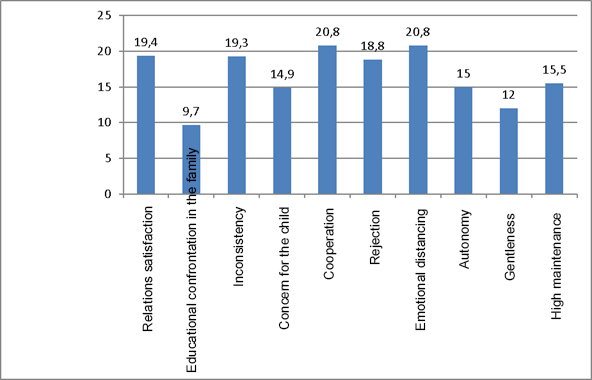
Figure 1 – Analysis of criteria for evaluating the interaction of parents with first-graders According to the results of descriptive statistics and frequency analysis, the average value on the scale of "undemanding / demanding" of the parent is 15.519. This is a fairly high indicator according to the norms of this methodology. Most parents have a high level of demands on the child and expect a high level of responsibility from him. The average value on the scale of "softness / severity of the parent" is 12.019. This is the average according to the norms of this methodology. Parents are moderately strict. The rules established in the relationship between parent and child and the pressure on the child are not particularly rigid. The average value on the scale of "autonomy / control in relation to the child" is 15.056. The value is above average, indicating that most parents have expressed controlling behavior towards the child. This can manifest itself in petty guardianship, obsession, restrictions. The average value on the scale of "emotional distance / closeness" of the child to the parent" is 20,889. According to this method, this means that most parents believe that they have built a trusting, close relationship with their child. The average value on the scale of "rejection/ acceptance of a child by a parent" is 18,889. In this case, high indicators indicate that most parents accept the child as a person: personal qualities and behavioral manifestations. The average value on the "lack of cooperation" scale is 20,889. This indicates the presence of equality and partnership in the relationship of parents and children in most parents. Authoritarian, indifferent or conniving parenting style is not typical for them. The average value on the "child anxiety" scale is 14.907. The result of this scale is above average. Most parents show a high degree of concern for their child and a low degree of freedom and independence of the child. The average value on the "inconsistency / consistency of the parent" scale is 19.389, which, according to this method, indicates that most parents demonstrate consistency and constancy in their requirements, in the application of punishments and rewards, in general, in relation to the child. The average value on the scale of "educational confrontation in the family" is 9.796, which, according to this method, indicates that low indicators on this scale indicate high cohesion and unanimity of family members on the issue of education. The average value on the scale of "satisfaction with the child's relationship with the parent" is 19.481. According to this method, the result indicates satisfaction in the relationship with the child of most parents. The results of the Questionnaire "Analysis of family relationships" by E.G. Eidemiller, V.K. Justitskis are presented in Table 1. Table 1 – Average values of the severity of parenting styles according to the questionnaire "Analysis of family relationships" | Indicators | Average | Stand. off. | Dude. | % | | Hyperprotection | 7,20 | 2,077 |
10 | 66,6 | | Hypoprotection | 1,53 | 0,915 | 0 | 0 | | Pandering | 5,00 | 2,777 | 3 | 20 | | Ignoring needs | 0,40 | 0,632 | 0 | 0 | | Excessive demands | 1,27 | 0,884 | 0 |
0 | | Insufficient requirements | 2,00 | 1,414 | 2 | 13,3 | | Excessive prohibitions | 1,53 | 0,743 | 0 | 0 | | Insufficient prohibitions | 2,40 | 1,056 | 7 | 46,6 | | Severity of sanctions | 0,53 | 0,743 | 0 | 0 |
| Minimality of sanctions | 3,67 | 0,976 | 9 | 60 | | Instability of parenting style | 0,33 | 0,617 | 0 | 0 | | Expanding the scope of parental feelings | 3,07 | 1,870 | 1 | 6,6 | | Preference for children's qualities | 1,33 | 0,976 | 0 | 0 | | Educational uncertainty of parents |
2,13 | 1,457 | 1 | 6.6 | | Phobia of losing a child | 3,93 | 1,668 | 3 | 20 | | Underdevelopment of parental feelings | 1,13 | 1,302 | 0 | 0 | | Projection of undesirable qualities | 0,60 | 0,828 | 0 | 0 | | Bringing conflict into the sphere of education | 0,67 |
0,900 | 0 | 0 | | Preference for feminine qualities | 1,67 | 0,900 | 0 | 0 | | Preference for masculine qualities | 0,87 | 0,915 | 0 | 0 | None of the indicators reached a diagnostic value, which may indicate that, in general, child-parent relations in this group have no significant violations. However, most parents have a tendency to such styles of family education as: hyperprotection (66.6%), minimality of sanctions (60%), insufficiency of requirements-prohibitions (46.6%). To study the level of adaptability of first graders used: 1. Questionnaire "The level of school motivation" (N.G. Luskanova). 2. Methodology for determining the personal adaptability of schoolchildren (A.V. Furman). 3. Methodology "Expert assessment of a child's adaptability to school" (Chirkov V.I., Sokolova O.L., Sorokina O.V.). According to the method of N.G. Luskanova, we present the obtained data graphically in Figure 2. 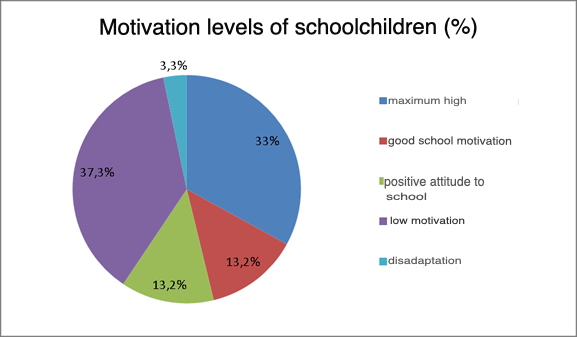
Figure 2 – Motivation levels of first graders 33% of first-graders were diagnosed with the highest possible level of school motivation and academic activity. These students are distinguished by the presence of high cognitive motives, the desire to most successfully fulfill all the requirements imposed by the school. They follow all the instructions of the teacher very clearly, are conscientious and responsible, they worry a lot if they receive unsatisfactory grades or comments from the teacher. In the drawings on the school theme, they depict the teacher at the blackboard, the lesson process, educational material, etc. 13.2% of first-graders were diagnosed with good school motivation. Most of those who successfully cope with educational activities have similar indicators. In school-themed drawings, they also depict learning situations, and when answering questions, they show less dependence on strict requirements and norms. Such a level of motivation is the average norm.
13.2% of first-graders were diagnosed with a positive attitude to school, but the school attracts more extra-curricular parties. Such children feel quite well at school, but more often go to school to communicate with friends, with teachers. They like to feel like students, have a beautiful briefcase, pens, notebooks. Cognitive motives of such children are formed to a lesser extent and the educational process attracts them little. In drawings on a school theme, such children usually depict school, but not educational situations. 37.3% of first-graders were diagnosed with low school motivation. Such students attend school reluctantly, prefer to skip classes. In the classroom, they often do extraneous things, games. They have serious difficulties in learning activities. They are in a state of unstable adaptation to school. In the drawings on the school theme, such children depict game plots, although they are indirectly connected with the school, they are present at school. 3.3% of first-graders were diagnosed with a negative attitude to school, school maladaptation. This student is experiencing serious difficulties at school: he does not cope with academic activities, has problems communicating with classmates, in relationships with teachers. School is often perceived by them as a hostile environment in which it is unbearable for them to stay. He may cry, ask to go home, show aggressive reactions, refuse to perform certain tasks, follow norms and rules. Drawings, as a rule, do not correspond to the school theme, but reflect the individual preferences of the child. According to the method of determining the personal adaptability of schoolchildren (A.V. Furman), the data presented in Figure 3 are obtained. 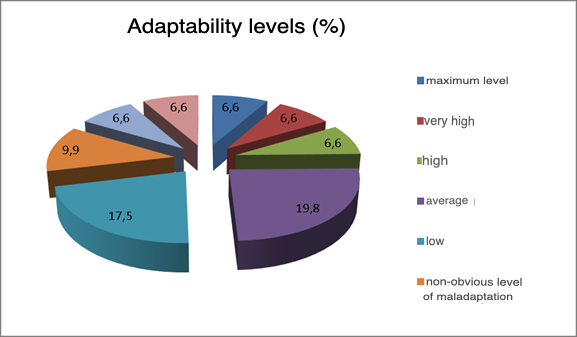
Figure 3 – Levels of adaptability of first graders According to the method "Expert assessment of a child's adaptability to school" (Chirkov V.I., Sokolova O.L., Sorokina O.V.), the data reflected in Figure 4 were obtained. 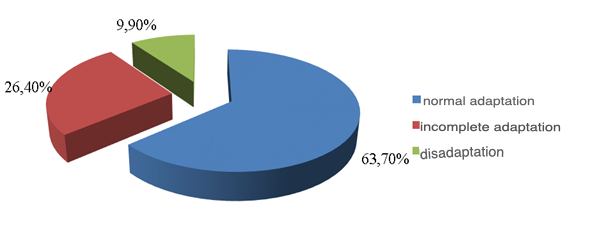
Figure 4 –Expert assessment of a child's adaptability to school From the data presented, it is obvious that 19 (63.7%) first-graders were diagnosed with normal adaptation. These students observe the regime, independently prepare school supplies and put them in a briefcase, they are interested in school, there are no gaps in the development of the curriculum, they are not capricious, do not refuse to go to school, easily get along with both classmates and the teaching staff of the school, occupy a high sociometric status in the classroom, have a developed educational motivation, arbitrary regulation. 26.4% of first-graders were diagnosed with incomplete adaptation. These students, with the help and control of their parents, observe the regime, prepare school supplies and put them in a briefcase, easily eliminate gaps in the development of the curriculum, they are comfortable in the classroom, where they have a lot of friends. 9.9% of first-graders were diagnosed with maladaptation, which is expressed in a weak habituation of the child to school, difficulties with mastering knowledge and skills, low working capacity, unformed motivation for learning, an unfavorable position among peers, a negative attitude to school. Next, let's consider the relationship between the parenting style and the type of adaptation to school. Figure 5 shows the parenting styles in the families of first-graders who have been diagnosed with normal adaptation. 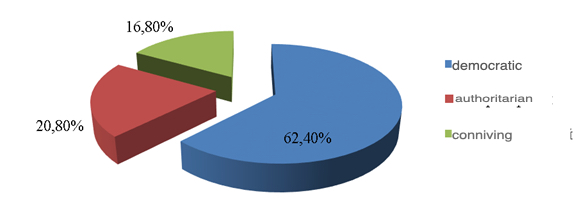
Figure 5 –Parenting style with normal adaptation As follows from the data presented in Figure 5, in the families of first–graders with normal adaptation, the democratic style of upbringing prevails - this style was revealed in 62.4% of families. In 20.8% of families, an authoritarian parenting style prevails. In 16.8% of families, a permissive parenting style prevails. A democratic parenting style can have a positive effect on a child's adaptation to school. This parenting style values cooperation, open communication and mutual respect between parents and children. This approach can help the child feel supported and be heard, which can increase his self-esteem and self-confidence. Children raised in a democratic parenting style are encouraged to make independent decisions and solve problems. This approach can help them develop critical thinking and decision-making skills that can be useful in school. They may also feel more comfortable seeking help from teachers and peers, which can contribute to improved relationships and academic success. A democratic parenting style can also help children understand the importance of rules and boundaries. Parents who use this style tend to set clear expectations and consequences for their children's actions, which can help children learn to follow the rules and understand the impact of their behavior on others. This can lead to better behavior at school and better interaction with classmates and teachers. In general, a democratic parenting style can contribute to a positive school experience of a child, contributing to his independence, critical thinking skills and understanding of rules and boundaries. Figure 6 shows the parenting styles in the families of first-graders who have been diagnosed with incomplete adaptation.
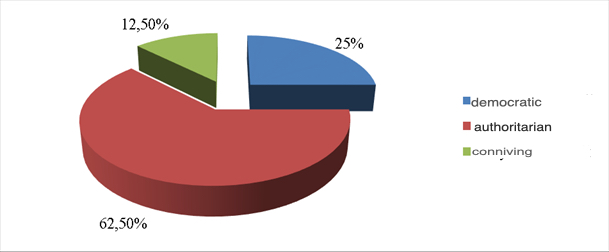
Figure 6 –Parenting style with incomplete adaptation As follows from the data presented in Figure 6, in the families of first–graders with incomplete adaptation, an authoritarian parenting style prevails - this style was revealed in 62.5% of families. In 25% of families, a democratic parenting style prevails. In 12.5%, the permissive parenting style prevails. An authoritarian parenting style characterized by strict rules, punishments and lack of warmth can negatively affect a child's adaptation to school in several ways. Firstly, children of authoritarian parents may experience great anxiety and fear towards their teachers, which makes it difficult to form positive relationships with them. This can lead to a lack of motivation to study and study in the classroom, which will interfere with their academic performance. Secondly, an authoritarian parenting style can limit a child's independence and problem-solving skills, since he is not given the opportunity to make decisions and learn from his mistakes. This can lead to self-doubt and unwillingness to take risks in training. Thirdly, authoritarian parents may prefer obedience and achievement over emotional well-being, which leads to a lack of emotional regulation and self-expression in children. This can manifest itself in behavioral problems in the classroom, such as aggression or isolation. In general, an authoritarian parenting style can hinder a child's social, emotional and academic development, making it difficult for him to adapt to school requirements. Figure 7 shows the parenting styles in the families of first-graders who have been diagnosed with maladaptation. 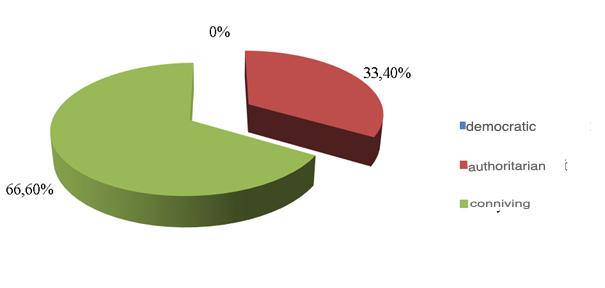
Figure 7 – Parenting style in case of maladaptation As follows from the data presented in Figure 7, in the families of first–graders with maladaptation, a permissive parenting style prevails - this style was revealed in 66.6% of families. In 33.4% of the family, an authoritarian parenting style prevails. The democratic style of upbringing in the families of first-graders with maladaptation has not been revealed. A permissive parenting style characterized by a lack of structure, rules and consequences can negatively affect a child's adaptation to school. Children who grow up in an atmosphere of permissiveness of their parents often have difficulty developing a sense of discipline and self-control, which may make it difficult for them to follow the rules and regulations in the school environment. As a result, children of such parents may have problems adapting to a structured classroom environment, they may not develop effective learning habits, and they may have difficulty completing assignments on time. In addition, since indulgent parents tend to be less involved in their child's education, these children may not receive the necessary support and guidance from their parents to succeed in school. In addition, permissive parenting can lead to disrespect for authority, which can lead to the fact that the child will start acting in the classroom and it will be difficult for him to follow the instructions of teachers and other school staff. Thus, a permissive parenting style can negatively affect a child's adaptation to school, hindering the development of discipline and self-control, making it difficult to comply with rules and regulations and causing disrespect for authorities. Next, let's consider the relationship between the type of adaptation to school and the type of parent-child interaction. Figure 8 shows the types of parent-child interaction in the families of first-graders who have been diagnosed with normal adaptation. 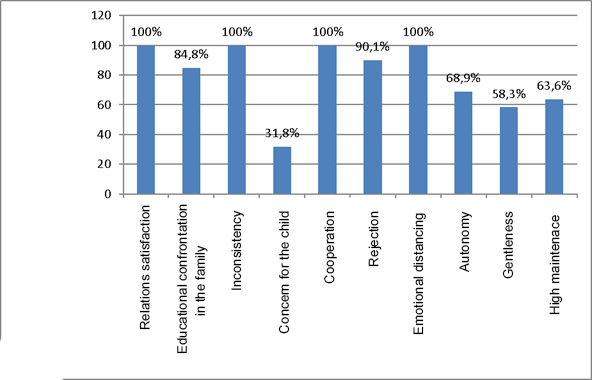
Figure 8 – Types of parent-child interaction during normal adaptation The analysis of the data presented in Figure 8 allows us to draw the following conclusions. In 63.6% of families of children diagnosed with "normal" adaptation, parents have a high level of demands on the child and expect a high level of responsibility from him. In 58.3% of families, the softness of parents towards the child is noted. In these families, the rules established in the relationship between parent and child are not particularly strict. In 68.9% of families, autonomy in relation to the child was diagnosed, which means that most parents do not establish total control over the child, do not establish petty guardianship and strict restrictions. In 100% of families, trusting, emotionally close relationships between parents and children are built. In 90.1% of families, parents accept the child as a person: personal qualities and behavioral manifestations. In 100% of families, constructive cooperation relations have been established between parents and children.
In 31.8% of families, parents show a high degree of concern for their child and thereby limiting the degree of freedom and independence of the child. In 100% of families, parents demonstrate consistency and constancy in their demands, in the application of punishments and rewards, in general, in relation to the child. 84.8% of families were diagnosed with high cohesion and unanimity of family members on the issue of upbringing. In 100% of families, parents are satisfied with the relationship with the child. Figure 9 shows the types of parent-child interaction in the families of first-graders who have been diagnosed with incomplete adaptation. 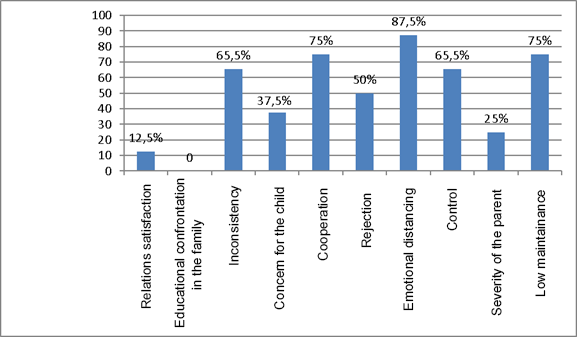
Figure 9 – Types of parent-child interaction with incomplete adaptation The analysis of the data presented in Figure 9 allows us to draw the following conclusions. In 75% of families, parents do not make special demands on the child and do not expect a high level of responsibility from him. In 25% of families, parents are strict. The rules established in the relationship between a parent and a child are particularly rigid, emotional pressure is exerted on the child. In 65.5% of families, parents strictly control the child's life, showing petty guardianship, obsession, setting numerous restrictions. In 87.5% of families, there is no emotional closeness between parents and children, there is no trusting and close relationship. In 50% of families, the child was diagnosed by the parent, indicating that the parents do not accept the child as a person, ignore his personal qualities and behavioral manifestations. In 75% of families, there is no cooperation between parents and children, there are no partnerships. In 37.5% of families, parents show a high degree of concern for their child and a low degree of freedom and independence of the child. Inconsistency was diagnosed in 65.5% of families – parents are not constant in their demands, in the application of punishments and rewards, in general, in relation to the child. In this selection, such an indicator as "educational confrontation in the family" was not diagnosed. This indicates the lack of unanimity of family members on the issue of upbringing. Only 12.5 families were diagnosed with satisfaction with the child's relationship with the parent. In other families, parents are not satisfied with the relationship with their children. Figure 10 shows the types of parent-child interaction in the families of first-graders who have been diagnosed with maladaptation. 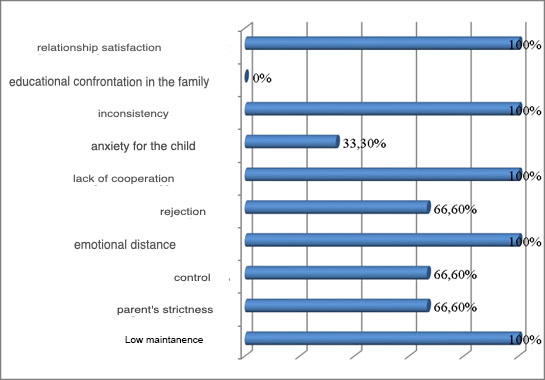 Figure 10 – Types of parent-child interaction in case of maladaptation The analysis of the data presented in Figure 10 allows us to draw the following conclusions. In 100% of families, parents do not make special demands on the child and do not expect a high level of responsibility from him. In 66.6% of families, parents are strict. The rules established in the relationship between a parent and a child are particularly rigid, emotional pressure is exerted on the child. In 66.6% of families, parents strictly control the child's life, showing petty guardianship, obsession, setting numerous restrictions. In 100% of families, there is no emotional closeness between parents and children, there is no trusting and close relationship. In 66.6% of families, a child was diagnosed by a parent, indicating that parents do not accept the child as a person, ignore his personal qualities and behavioral manifestations. In 100% of families, there is no cooperation between parents and children, there are no partnerships. In 33.3% of families, parents show a high degree of concern for their child and a low degree of freedom and independence of the child. Inconsistency was diagnosed in 100% of families – parents are not constant in their demands, in the application of punishments and rewards, in general, in relation to the child. In this selection, such an indicator as "educational confrontation in the family" was not diagnosed. This indicates the lack of unanimity of family members on the issue of upbringing. In 100% of families, parents are not satisfied with the relationship with their children. Correlation analysis will reveal the relationship between the methods: "Parent-child interaction"
- "Expert assessment of a child's adaptability to school" We put forward a hypothesis about the influence of interaction in the child's family on his adaptability. Let's summarize the results of the methods in a single table 2. Table 2 – Source table for calculation | Respondent's No. | The sum of points according to the method of "Parent-child interaction", X – factor of influence | The sum of points according to the method "Expert assessment of adaptability a child to school"; Y – dependent variable | | 1 | 14 | 23 | | 2 | 16 | 26 | | 3 | 16 | 27 | | 4 | 7 | 20 | | 5 | 5 | 16 |
| 6 | 4 | 10 | | 7 | 6 | 19 | | 8 | 18 | 34 | | 9 | 16 | 29 | | 10 | 16 | 31 | | 11 | 14 | 23 | | 12 | 14 | 32 | |
13 | 16 | 24 | | 14 | 7 | 18 | | 15 | 5 | 18 | | 16 | 14 | 25 | | 17 | 16 | 30 | | 18 | 16 | 31 | | 19 | 4 | 6 | | 20 |
16 | 32 | | 21 | 5 | 20 | | 22 | 8 | 17 | | 23 | 16 | 32 | | 24 | 5 | 19 | | 25 | 4 | 4 | | 26 | 7 | 33 | | 27 |
18 | 28 | | 28 | 14 | 27 | | 29 | 16 | 30 | | 30 | 18 | 25 | Let's move on to the statistical analysis of the obtained regression equation: checking the significance of the equation and its coefficients, investigating absolute and relative approximation errors. For an unbiased estimate of the variance, we will perform the following calculations:
Unbiased error ? = Y - Y(x) = Y - X*s (absolute approximation error) | Y | Y(x) | ? = Y - Y(x) | ?2 | (Y-Usr)2 | |? : Y| | | 14 | 11.363 | 2.637 | 6.955 | 5.29 | 0.188 | | 16 | 12.96 | 3.04 | 9.241 | 18.49 | 0.19 | | 16 | 13.493 | 2.507 | 6.287 | 18.49 | 0.157 | | 7 | 9.765 | -2.765 | 7.647 | 22.09 | 0.395 | | 5 | 7.635 | -2.635 | 6.946 | 44.89 | 0.527 | | 4 | 4.441 | -0.441 | 0.194 | 59.29 | 0.11 | | 6 | 9.233 | -3.233 | 10.452 | 32.49 | 0.539 | | 18 | 17.22 | 0.78 | 0.609 | 39.69 | 0.0433 | | 16 | 14.558 | 1.442 | 2.081 | 18.49 | 0.0902 | | 16 | 15.623 |
0.377 | 0.142 | 18.49 | 0.0236 | | 14 | 11.363 | 2.637 | 6.955 | 5.29 | 0.188 | | 14 | 16.155 | -2.155 | 4.644 | 5.29 | 0.154 | | 16 | 11.895 | 4.105 | 16.849 | 18.49 | 0.257 | | 7 | 8.7 | -1.7 | 2.891 | 22.09 | 0.243 | | 5 | 8.7 | -3.7 | 13.693 | 44.89 | 0.74 | | 14 | 12.428 | 1.572 | 2.472 | 5.29 | 0.112 | | 16 | 15.09 | 0.91 | 0.828 | 18.49 | 0.0569 | | 16 | 15.623 | 0.377 | 0.142 | 18.49 | 0.0236 | | 4 | 2.311 | 1.689 | 2.853 | 59.29 | 0.422 | | 16 | 16.155 | -0.155 | 0.024 | 18.49 | 0.00969 | | 5 | 9.765 | -4.765 | 22.709 | 44.89 | 0.953 | | 8 | 8.168 | -0.168 | 0.0282 | 13.69 | 0.021 | | 16 | 16.155 | -0.155 | 0.024 | 18.49 | 0.00969 | | 5 | 9.233 | -4.233 | 17.917 | 44.89 | 0.847 | | 4 | 1.246 | 2.754 | 7.585 | 59.29 | 0.689 | | 7 | 16.687 | -9.687 | 93.847 | 22.09 | 1.384 | | 18 | 14.025 | 3.975 | 15.8 | 39.69 | 0.221 | | 14 | 13.493 | 0.507 | 0.257 | 5.29 | 0.0362 | | 16 | 15.09 | 0.91 | 0.828 | 18.49 | 0.0569 | | 18 | 12.428 | 5.572 | 31.05 | 39.69 | 0.31 | | | | | 291.951 | 800.3 | 8.996 | Average approximation error A=8, 996/30*100=29,99 The variance estimate is equal to: se2=(Y-Y(X))T(Y-Y(X))=291.951 The unbiased estimate of the variance is: S=1|30-*1-18291.951=10.4 Standard deviation estimate (standard error for Y estimation): Find the estimate of the covariance matrix of the vector k = S 2 •(X T X)-1 | k(x) = 10.43 | | 0,3448 | -0,01318 | | -0,01318 | 0,000558 | | | | = |
| 3,5957 | -0,1374 | | -0,1374 | 0,00582 | | | | Partial elasticity coefficients. The partial coefficient of elasticity shows how much percent on average the attribute-result y changes with an increase in the attribute-factor x j by 1% from its average level with a fixed position of the other factors of the model. E1=0.532*(23.6/11,7=1,07 If the factor x 1 changes by 1%, Y will change by 1.076%. The partial coefficient of elasticity |E 1| > 1. Therefore, it significantly affects the effective feature Y. Standardized partial regression coefficients - ?-coefficients (? j) show by which part of its mean square deviation S (y) the attribute-result y will change with a change in the corresponding factor x j by the value of its mean square deviation (S x j) under the constant influence of other factors (included in the equation). According to the maximum ? j, it is possible to judge which factor has a stronger effect on the result Y. So for our example, the direct influence of factor x 1 on the result Y in the regression equation is measured by ? j and is ; the indirect (indirect) influence of this factor on the result is defined as: rx1x2?2 = * = 0 A comparative assessment of the influence of the analyzed factors on the effective feature is made: - the average coefficient of elasticity, showing how many percent of the aggregate average result y will change from its average value when the factor x i changes by 1% of its average value; - ?–coefficients showing that if the value of the factor changes by one standard deviation S xi, then the value of the effective feature will change on average by ? of its standard deviation; - the share of each factor in the total variation of the effective feature is determined by the coefficients of separate determination (separate definition): d 2 i = r yxi ? i. d21 = * = 0 In this case , the equality must be fulfilled: ?di2 = R2 = 0 That is, the relationship between the Y sign and the X i factors is strong. Coefficient of determination: R 2 = 0, k oefficient determination: R2= 0.7972 = 0.6352 The closer this coefficient is to unity, the more the regression equation explains the behavior of Y. Thus, the correlation analysis method revealed a direct relationship between the parenting style and the level of adaptation of the child. Conclusion. Thus, the conducted research has shown that in families with a democratic type of upbringing, the process of adaptation of first-graders to school develops favorably. Children from these families have formed all the components of school readiness called: social; physiological; psychological; personal; intellectual; emotional-volitional; communicative-speech; motivational. Child-parent relations in families with a democratic type of upbringing provide a favorable psychological atmosphere for the child during the period of adaptation to school. Openness and trust between parents and children allows us to form a system of subordinate motives, which provides a general orientation of the behavior of a younger student. Taking the most significant motive, the student is able to move towards the intended goal, leaving aside desires that arise suddenly, situationally. Thus, parents from families with a democratic type of upbringing provide targeted assistance to the child in adaptation and provide him with comprehensive psychological support. This allows the younger student to painlessly enter the renewed living space, called school life. The situation is different in families in which permissive and authoritarian parenting styles are the predominant types of child-parent relationships. Thus, in families with a permissive parenting style, proper upbringing is not provided by parents, attention is not paid to the education and development of children during the preparation for school. Being brought up in families with a permissive parenting style, children do not receive proper attention from their parents, do not satisfy their need for communication. They develop a negative attitude towards their parents, unwillingness to understand and accept them and build effective communication with them. All these factors lead to difficulties in the adaptation period, since younger schoolchildren from such families do not have developed components of school readiness, because parents did not ensure the development of voluntary attention, fine motor skills, did not form recalculation skills and motor skills, did not pay enough attention to the development of graphic activity. The child-parent relationship in families with an authoritarian parenting style also has an adverse effect on the adaptation process. The lack of trusting and open relationships between parents and children in families with a permissive parenting style leads to the fact that younger schoolchildren do not perceive the requirements of teachers, do not know how to build effective communication with classmates, shun them, do not show initiative in school and extracurricular activities. Students from families with an authoritarian parenting style cannot count on the support and assistance of parents in case of difficulties and difficult situations. Thus, there is a direct relationship between child-parent relations and the adaptation of first-graders to school. For students who are brought up in families with a democratic type of upbringing, successful, full adaptation is characteristic. Schoolchildren from families in which permissive and authoritarian parenting styles are the predominant types of child-parent relationships, incomplete adaptation and maladaptation prevail.
References
1. Aborina, M.V. (2018) Analysis of parent-child relations in the system of social adaptation of schoolchildren. Modern scientific research and development (ðð. 45-47.). Moscow.
2. Adilova, Kh. L. (2019) Ways of adaptation of elementary school students to school education. Achievements of science and education. (ðð. 71-73). Moscow.
3. Antipina, E.A. (2019). The relationship between styles of parent-child relationships and readiness for schooling of older preschoolers. School of Responsible Parenthood: Proceedings of the All-Russian Scientific and Practical Conference, (ðð. 72-76). Vladimir.
4. Varavina, E.A. (2021) .Styles of child-parent relationships: theoretical and historical aspect. Bulletin of the Magistracy (ðð. 97-99).
5. Varga, A. Ya. (1986). Structure and types of parental relationship: dis. ... cand. psychol. Sciences. Moscow.
6. Vasyuk, S.N. (2018). Adaptation of first-graders to school. Questions of science and education, 23, 137-139).
7. Gaidukova, D.V. (2022). Child-parent relationships as a factor in the adaptation of children aged 6-7 to school. Problems and prospects for the development of primary education: Collection of articles based on the materials of the 2nd All-Russian Scientific and Practical Conference, (pp. 56-61). Nizhny Novgorod.
8. Gogleva, A.V. (2018). Influence of features of child-parent relations on the process of socio-psychological adaptation of first-graders to school education. Science of the Young: Collection of Scientific Articles of the Participants of the XI All-Russian Scientific and Practical Conference with International Participation (ðð. 338-341). Arzamas.
9. Grigorieva, E.L. (2020). Methods of adaptation of first-graders to new activities and the team in the innovative educational space. (ðð. 32-39). Bulletin of the Tula State University.
10. Zhuraeva, N.B. (2019). Adaptation of first-graders to school. Achievements of science and education, 10, 12-13.
11. Zelenaya, L.V. (2016). The problem of adaptation in pedagogical psychology. Modern psychology: materials of the IV Intern. scientific conf. (ðð. 43-45). Kazan.
12. Kalashnikova, S.V. (2020) The problem of socio-psychological adaptation in psychology. Materials of the All-Russian Student Scientific and Practical Conference "Actual Problems of Education: the Position of the Young". (ðð. 173-175). Chelyabinsk.
13. Matyushkina, E.G. (2020). The relationship of parent-child relations with the level of adaptation of younger schoolchildren at school. Psychology in a changing world: problems, hypotheses, research: collection of materials of the international student scientific and practical conference, (ðð. 228-232). Chelyabinsk.
14. Movsisyan, K.A. (2019). Favorable conditions for child-parent relationships in the formation of the student's personality. Future of Science-2019: collection of scientific articles of the 7th International Youth Scientific Conference (ðð. 223-226). Kursk.
15. Nazarevich, O.S. (2012). Theoretical approaches to the definition of socio-psychological aspects of personality adaptation. Bulletin of Ugric Studies, 4, 34-36.
16. Ovcharova, R.V.(2006) Parenthood as a psychological phenomenon. (496 p.) Moscow: Moscow Psychological and Social Institute.
17. Petrovskikh, O.N. (2019). Methodological improvement of adaptation of future first-graders to school. Social Pedagogy, 2, 64-67.
18. Rostovtseva, M.V. (2021). Methodological approaches to the study of social adaptation of personality: monograph. Krasnoyarsk,.
19. Sarapultseva, P.P. (2021) Influence of parent-child relations on the social adaptation of a child of primary school age. Actual problems of personality psychology: Collection of scientific papers (pp. 175-182) .Yekaterinburg.
20. Serebryakova, T.A. (2018). The role of the family in the effective adaptation of the child to the educational organization. Problems of modern pedagogical education, 6, 427-431.
21. Sidorina, E.V. (2019).To the problem of adaptation of first-graders to learning at school. Problems of modern pedagogical education, 62, 302-305.
22. Yavorskaya, S. Yu. (2019). Influence of parent-child relations on the process of social and psychological adaptation in younger school age. Forum of Young Scientists, 3, 886-894.
23. Hoste, G. 1997. Rope skipping. Game, amusement, helth. CESS Bulletin, 6, 2.
24. Ken, M. (1991). Solis. Ropics. The jimp rope primer. Human Kinetics Books. (89 p.). Champaing, Illinois.
25. Lollge, H. (2022). Recommendations and standard guidelines forse conf. Jnergometry, Jilisce. London: Acad. Press.
26. Masironi, R. Denolin H. (1985). Physical activity in disease provention and treatmtent. Padua: Piccin; Boston etc: Butter worth.
First Peer Review
Peer reviewers' evaluations remain confidential and are not disclosed to the public. Only external reviews, authorized for publication by the article's author(s), are made public. Typically, these final reviews are conducted after the manuscript's revision. Adhering to our double-blind review policy, the reviewer's identity is kept confidential.
The list of publisher reviewers can be found here.
The topic of this article is traditional in its relevance. A large number of works have been carried out on this occasion and all of them are of interest to the readership, since adaptation to school is of crucial importance for teachers, parents, administration, educators. School adaptation and school readiness depend on many factors, among which the factor of child-parent relations is of crucial importance. In substantiating the relevance of his research, the author correctly writes that attention to the problem of school adaptation of first-graders in modern psychological and pedagogical theory and practice is increasing due to the fact that the number of children with difficulties in learning activities, experiencing increased anxiety, problems in establishing relationships with classmates and teachers is growing. Unsatisfactory child-parent relations at the stage of primary school education provoke the emergence of more complex disorders at an older age, contribute to the formation of various character accentuations during adulthood. All this is true and there is no doubt. The aim of the study is to "determine the level of adaptation to learning among first-graders raised in families with different types of child-parent relationships." The subject of the study is the relationship between child–parent relations and the effectiveness of adaptation of first-graders. Such formulations are also understandable and accepted. But the text does not show the rationale for scientific novelty and the methodology of the study. This needs to be improved. The style of presentation of the text is scientific and research. The author analyzes the literature data and provides the results of his own research. The structure of the work generally meets the generally accepted requirements. But there is no distinction in the text between the introduction and the main part (the theoretical formulation of the problem). The end of the introduction and the beginning of the main part are separated from each other as if formally, since both there and there are literature data. The content of the article indicates a large amount of research carried out, during which quite suitable methods were used. So, the author in the illustrative material provides an analysis of the criteria for evaluating the interaction of parents with first-graders, parenting styles according to the questionnaire "Analysis of family relationships", levels of school motivation and school adaptation. In general, the material is presented in an understandable way and indicates that the styles of child-parent relations have an impact on the success of the child's school adaptation process. The data shows that 37.3% of first-graders were diagnosed with low school motivation. Such students attend school reluctantly, preferring to skip classes. They often engage in extraneous activities and games in the classroom. They have serious difficulties in learning activities. They are in a state of unstable adaptation to school. 3.3% of first-graders had a negative attitude towards school, school maladjustment. In such cases, the student experiences serious difficulties at school: he does not cope with educational activities, has problems communicating with classmates, in relationships with teachers. They often perceive school as a hostile environment in which they cannot bear to stay. He may cry, ask to go home, show aggressive reactions, refuse to perform certain tasks, follow norms and rules. Only the author constantly writes about some drawings, although they have never been mentioned anywhere before as a method of diagnosing school adaptation. The author believes that 9.9% of first-graders were diagnosed with maladaptation, which is expressed in a weak child's habituation to school, difficulties with learning knowledge and skills, low efficiency, unformed motivation for learning, an unfavorable position among peers, and a negative attitude towards school. Some of the author's data is not entirely clear. For example, when it is noted that "In 100% of families, parents are not satisfied with the relationship with their children." Apparently, there is an incorrect phrase. It needs to be corrected or clarified. The received factual data on the text have an interpretation that is quite reasonable and convincing. But at the very end, when the author tries to show the results of statistical processing of the material, the table is clearly designed incorrectly. In this case, it would be better either to arrange this table in a more understandable way, or to present statistical indicators in a descriptive way, indicating what is what and how strongly connected. Or, in the previous corresponding illustrations, find an opportunity to show the identified correlations using the appropriate icons. The conclusions need to be finalized. They should be specific and presented only in an affirmative form. So far, they just look like a piece of text. There is no conclusion. It should be and it is advisable to briefly present the results of the entire study (in a descriptive way). The bibliographic list contains sources on the research topic. After finalizing the text, this article can be recommended for publication as being of interest to the readership.
Second Peer Review
Peer reviewers' evaluations remain confidential and are not disclosed to the public. Only external reviews, authorized for publication by the article's author(s), are made public. Typically, these final reviews are conducted after the manuscript's revision. Adhering to our double-blind review policy, the reviewer's identity is kept confidential.
The list of publisher reviewers can be found here.
The subject of the study is the relationship between child-parent relations and the effectiveness of adaptation of first-graders. Research methodology. To study the type of child-parent relations, the following methods were used: the questionnaire "Parent-child interaction" I.M. Markovskaya (for parents of preschoolers and younger schoolchildren); the questionnaire of the style of parental education (DIA) E.G. Eidemiller, V.K. Justitskis (for younger schoolchildren). To study the level of adaptation of first-graders, the following methods were used: the questionnaire "The level of school motivation" (N.G. Luskanova); the methodology for determining the personal adaptability of schoolchildren (A.V. Furman); the methodology "Expert assessment of the child's adaptability to school" (Chirkov V.I., Sokolova O.L., Sorokina O.V.). Unfortunately, there is no hypothesis in the work. It turns out that the author applies techniques, conducts correlation analysis, but it is unclear what he is checking? Relevance: "the number of children with difficulties in learning activities, experiencing increased anxiety, problems in establishing relationships with classmates and teachers is growing." "Often, the reason for difficulties in adapting to school lies in the lack of formation of personal forms of communication between a younger student and his parents, in the inability of parents to build communication with a child according to the type of "child – adult as an equal". However, the question of scientific relevance remains. What else has not been explored in this topic? Scientific novelty: the levels of adaptation to learning among first-graders with democratic, permissive and authoritarian parenting styles are described. Style, structure, content. The style is scientific. The work is not clearly structured enough: the relevance of the research topic, the theoretical formulation of the problem, the study (?), the empirical basis of the study, the results (including cumbersome correlation analysis), the conclusion. The results of the methods are described: 1. Questionnaire "Parent–child interaction" by I.M. Markovskaya. The results of all scales are described. 2. Questionnaire "Analysis of family relationships" E.G. Eidemiller, V.K. Justitskis. "None of the indicators has reached a diagnostic value, which may indicate that, in general, child-parent relations in this group do not have significant violations. However, most parents have a tendency towards such styles of family education as: hyperprotection (66.6%), minimal sanctions (60%), insufficient requirements-prohibitions (46.6%)." 3. Questionnaire "The level of school motivation" (N.G. Luskanova). 33% of first-graders were diagnosed with the highest possible level of school motivation and academic activity. 13.2% of first-graders were diagnosed with good school motivation. 13.2% of first-graders were diagnosed with a positive attitude towards school, but the school attracts more with extracurricular aspects. 37.3% of first-graders were diagnosed with low school motivation. 3.3% of first-graders were diagnosed with a negative attitude towards school, school maladjustment. 4. The methodology for determining the personal adaptability of schoolchildren (A.V. Furman). The levels of adaptability of first-graders are determined. 5. The methodology "Expert assessment of a child's adaptability to school" (Chirkov V.I., Sokolova O.L., Sorokina O.V.). 19 (63.7%) first-graders were diagnosed with normal adaptation. 26.4% of first-graders were diagnosed with incomplete adaptation. 9.9% of first-graders were diagnosed with maladaptation. 6. After that, the ratio of the parenting style and the type of adaptation to school is lost: with normal adaptation, the democratic parenting style prevails, with incomplete adaptation, the authoritarian parenting style prevails, with maladaptation, the permissive parenting style prevails. 7. After that, the relationship between the type of adaptation to school and the type of parent-child interaction is considered. And the characteristics of interaction with normal, incomplete adaptation and maladaptation are described. 8. Then the results of the correlation analysis are described. A direct relationship between the parenting style and the child's level of adaptability has been revealed. The bibliography is clearly incomplete. A Google search of the academy gives a lot of literature on the topic: The influence of the characteristics of child-parent relations on the process of socio-psychological adaptation of first-graders to school; The influence of child-parent relations on the adaptation of first-graders to school; Improving the pedagogical competence of parents on the adaptation of a first-grader (junior high school student); The specifics of the relationship between psychological adaptation and the type of child- parental relations of primary school children, etc. It is unclear whether child-parent relations are studied in foreign sources 24,25,26? There is no appeal to the opponents. Conclusions: in families with a democratic type of upbringing, the process of adaptation of first-graders to school develops favorably. In families with a permissive parenting style, proper upbringing is not provided by parents, attention is not paid to the education and development of children in preparation for school. Child-parent relationships in families with an authoritarian parenting style lead to maladaptation. The conclusions are banal. The interest of the readership: the work may be interesting after significant revision, correction of these shortcomings.
Link to this article
You can simply select and copy link from below text field.
|
|



